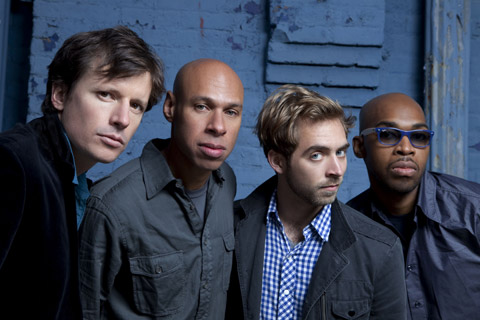
PRECISION CRAFTED The collective James Farm like pop music, but they also like flexing their jazz-virtuoso muscles. |
When Antoine Batiste is looking for a guitarist, the one thing he doesn't want to hear is "white boys with bad hair playin' them cowboy keys." Batiste is, of course, the trombonist played by Wendell Pierce on HBO's Treme, and his outburst at a rehearsal of his newly formed band gets a good, sympathetic laugh from the crew. Race aside, everyone knows those "cowboy keys" represent a border no one wants to cross. Antoine and his guys are playing New Orleans soul and funk, and they don't need those cowboy keys turning them around.
What are those forbidden keys, exactly? You'd have to figure Antoine's talking about the kind of open chords and progressions that are the standards of country, folk, and rock — the kind of "guitaristic" progressions that Steve Swallow began writing for people like Larry Coryell and Jerry Hahn in Gary Burton's band more than 40 years ago and that were widely disseminated by, among others, another Burton player, Pat Metheny.
But Antoine's line struck home with me for another reason: as more and more jazz-identified bands stretch out into other genres, the music is once again undergoing a shift that, to some people, could make it unrecognizable as jazz. I'm not complaining. In fact, I think it's pretty cool. From Bill Frisell's country licks to the Brian Blade Fellowship's hybrid jazz-rock to the bluegrass leanings of Julian Lage (the most recent Burton-band guitarist), and a general taste for rhythm other than "swing," the music keeps changing, opening up. Of course, there's still plenty of "jazzy jazz" (as Fred Hersch calls it), but even much of this would be as strange to some listeners as Cecil Taylor was half a century ago. A few new releases show different ways in which jazz continues to grow as it absorbs different influences both old and new.
Take Jeremy Udden's If the Past Seems So Bright (Sunnyside), the second album from his band Plainville (named for his Massachusetts home town). Udden is an NEC grad, an alto and soprano saxophonist with a strong streak of Lee Konitz lyricism, who served a good stretch with Boston's Either/Orchestra. But with Plainville he's begun to identify himself more with indie rock ("Throwing Lester Young and the Pixies into the same house and seeing if they can live together," he says in his press material).
Like the Blade Fellowship, Udden favors long, arching, orchestral structures. When he — or one of his crew — comes in for a solo, it could be improvised, or it could be a written transitional passage. He varies the textures with a mix of banjo, electric guitar, Fender Rhodes, vintage Prophet synth, Wurlitzer piano, acoustic bass, and drums. It's a warm sound, downhome in an odd way. As if the Band, after fading like ghosts into the mists of Saugerties, had re-emerged all these years later as an instrumental indie-jazz band in Brooklyn.
Udden isn't afraid to take things slow. On tunes like "Sad Eyes" (the album opener) or "Film," drummer RJ Miller lays down a slow, slow thump-and-thwack rhythm. It recalls something Udden told me a few years ago, about how he likes Miller because he has the patience to do "the same thing" through a whole song and not feel the jazz drummer's compulsion to comment musically on everything that's going on around him